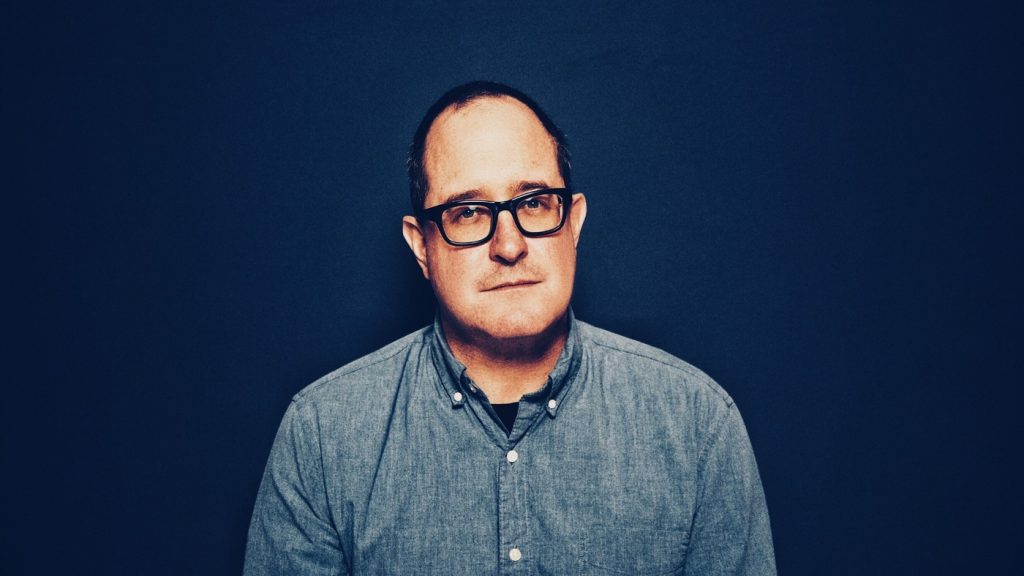
With his new album, I Need A New War (Partisan), the Hold Steady’s Craig Finn wraps up a solo trilogy that began with 2015’s Faith In The Future. Given the textured tunefulness and frequent glimmers of hope that marked 2017’s We All Want The Same Things, War feels a little like a somber slap in the face. The detailed character studies continue, mostly set to the unflattering backdrop of Finn’s adopted hometown of New York City and its damaged mystique. Saxophones burb, trumpets moan, and the backup singing duo of Cassandra Jenkins and Annie Nero do their best to calm frayed nerves. But there’s something even more unsettling about Finn’s hapless protagonists this time around—as if they’re treading water with one hand. Can one guy really know so many desperate souls, or is he just making this stuff up? We inquired.
I Need I New War has an uneasiness to it that took me a little off-guard. It’s definitely a darker record. We were trying to do something different. We All Want The Same Things seemed super empathetic. With this one, we were laying things a little more bare. Then again, the years between the two albums have been sort of dark—not necessarily on a personal level, but on a macro level.
It also has a sort of nostalgic feel—especially tracks like “Indications” and “Magic Marker.”
When (producer/musician) Josh (Kaufman) and I were recording this album, we started talking about this idea of days gone by—not as a focal point but more as a wistful feeling to try to capture in some of the music. It harkens back to something, but you can’t quite put your finger on it. We were also searching for a groove you could move your body to. Things like “Something To Hope For” and “A Bathtub In The Kitchen” have that sway to them—more of a pulse.
Is it safe to say that the characters in these new songs are composites?
Some are more real than others, and some are more fictitious. I wanted to do something that’s about people today. When I’m writing for the Hold Steady, oftentimes the characters are engaged in bad behavior or bad decisions, and big, tragic things are happening to them. But the desperation I’m trying to write about on these last three solo records is more often about people who’ve done the right thing—or tried to—and it still hasn’t necessarily worked out for them. There’s less overt bad behavior and more of a struggle with the modern world. The modern world is changing quickly—too quickly for these characters—and they’re having difficulty keeping pace with it and kind of getting ground up in it.
So is it a conscious thing—the way you write differently for the band than you do for your solo work?
With the Hold Steady, I’m often writing to parts the other guys give me. And when it’s Tad (Kubler) or Steve (Selvidge) with these big guitar riffs, it feels like big things have to happen. It doesn’t feel like a reflection of a vulnerable character who’s tired from work or whatever. The stuff on the solo records starts from a smaller place and builds outward, creating a different world that may be a little more introspective, with vulnerable characters who might be moving a little slower.
Are there any key differences in the way this album came together, as opposed to the previous two?
The big difference is that we brought in Cassandra Jenkins, and her and Annie Nero sang together on one microphone. We were thinking of those Leonard Cohen records where there’s almost an answer with the backup vocals—that whispering in your ear, “It’s going to be OK.”
The brass seems more pronounced, too. What am I hearing?
Sax, trumpet, clarinet and trombone. Stuart Bogie is a good friend of mine who’s worked on all three records. I’ve been writing more with his parts in mind and leaving more space for him.
So, now that the trilogy is complete, where do you go from here?
I’m always writing songs, so I guess we’ll see. A trilogy wasn’t something I set out to write. It’s more of a way of me understanding these three records together.
The nine Hold Steady singles you’ve released over last few years almost amount to a full album.
They’re almost like dispatches. We haven’t been touring, but we’ve been doing these weekends where we play shows in one town. It takes some of the travel out of the equation, makes things way more musical and underscores the community around the band. So I thought, “What if we dropped a single beforehand, and then it’s attached to that weekend.” Also, with a lot of our favorite bands—from the Beatles to the Smiths to the Clash—their classic record was a collection of singles. The music industry feels pretty broken, so I think it’s a mistake to do everything in a traditional manner. We already know where our fans are.
—Hobart Rowland






